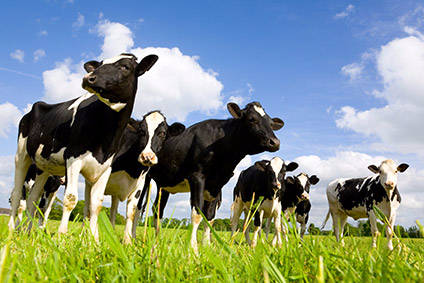
A UK-Australia free-trade deal has been officially confirmed, with London emphasising a caveat to address concerns voiced by the country’s farmers over the risk of cheaper meat imports from a much larger agricultural partner.
“British farmers will be protected by a cap on tariff-free imports for 15 years, using tariff-rate quotas and other safeguards. We are also supporting agricultural producers to increase their exports overseas, including to new markets in the Indo-Pacific,” a UK government statement from the Department for International Trade read today (15 June) following reports earlier in the day that “broad terms” of an agreement had been reached.

Discover B2B Marketing That Performs
Combine business intelligence and editorial excellence to reach engaged professionals across 36 leading media platforms.
The finer details of the trade deal, however, are still light, with the UK government saying a “final agreement in principle will be published in the coming days” following the conclusion of talks last night between Prime Minister Boris Johnson and his Australian counterpart Scott Morrison.
Johnson said in a statement: “Today marks a new dawn in the UK’s relationship with Australia, underpinned by our shared history and common values. Our new free trade agreement opens fantastic opportunities for British businesses and consumers.
“This is global Britain at its best – looking outwards and striking deals that deepen our alliances and help ensure every part of the country builds back better from the pandemic.”
Over a 15-year transition period, the two countries are aiming for tariff-free trade on all goods from biscuits and confectionery to Scottish whisky and automobiles, along with zero import quotas. The deal also covers the services industry, while the partners have agreed to collaborate on issues pertaining to defence and security, technology and climate change, including a so-called future Clean Tech Partnership.

US Tariffs are shifting - will you react or anticipate?
Don’t let policy changes catch you off guard. Stay proactive with real-time data and expert analysis.
By GlobalDataIt is the first major free-trade deal the UK has formulated from scratch since the country left the European Union in January. It has been acknowledged by the UK government as a stepping stone toward joining the broader Comprehensive and Progressive Agreement for Trans-Pacific Partnership (CPTPP).
The CPTPP is regarded as one of the world’s largest free trade agreements valued at GBP9trn (US$12.6trn) and encompassing 11 countries including Australia.
Existing trade between the UK and Australia was valued at GBP13.9bn last year.
For his part, Australian Prime Minister Morrison said in a separate statement today that the two countries need to work on “our economic strengths between our economies”.
He continued: “That takes many forms – it’s investing in our critical supply chains, in critical technologies and ensuring that the economic strength and advantages that we have in our partnership go further, go higher to reinforce the jobs and the success of our economies in what is a very, very challenging period.
“It is an important time, and we are very respectful of the process that we know the UK will be going through at this time. It is a different world to move beyond, where the UK has been a part of the EU for all these many years. We remember in Australia very vividly the impact of the UK going into the common market back in the early ’70s. That had a devastating blow on Australian producers. The Brexit that has occurred is an opportunity for us to pick up where we left off all those many years ago, and to once again realise the scale of the trading relationship that we once had.”
In the meantime, UK farmers and the representative National Farmers’ Union organisation will be eyeing the forthcoming detail on import quotas after expressing concerns they will lose out competitively on imports of beef and lamb in particular. They are also likely looking for commentary around maintaining the UK’s high health standards on meat and animal welfare when the use of growth hormones, pesticides and feed additives is allowed in Australia but are banned in the UK.
The organisation representing the UK’s food and beverage manufacturers, The Food and Drink Federation, said its members exported GBP800m worth of goods to Australia last year.
Dominic Goudie, the head of international trade at the FDF, said: “It is now vital that we know the detail of what has been agreed to help businesses understand and begin to prepare for the new terms of trade.
“Food and drink manufacturers will hope that this deal will remove burdensome and unnecessary barriers to trade that will provide a timely boost for our industry’s post-Covid recovery. The terms must also ensure that consumers have continued confidence that any agreement maintains the highest food safety and animal-welfare standards.”
Liz Truss, the UK’s Secretary of State for International Trade, said of the deal: “It is a fundamentally liberalising agreement that removes tariffs on all British goods, opens new opportunities for our services providers and tech firms. Membership [of the CPTPP] will create unheralded opportunities for our farmers, makers, innovators and investors to do business in the future engine room of the global economy.”





